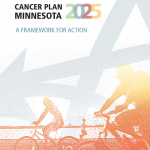partnerships
The Minnesota Cancer Alliance community is a group of people with diverse characteristics, linked by shared interest and engaged in joint action to reduce the human and economic impact of cancer in Minnesota. There is immense power when we stand together. Join us to work in cohesive groups with a variety of skills, backgrounds, expertise and passion to achieve our mission and vision.
You can follow our progress and hear the voices of our members through our monthly newsletter: Collective Action: Connect, Collaborate, Advocate. The success of Cancer Plan Minnesota depends on people taking action to achieve the objectives and strategies it identifies. It is important to remember that this plan marks a starting point, not an endpoint. Its ability to move traditional and non-traditional partners to action will be the plan’s true measure of success.
The following organizations are members of the Minnesota Cancer Alliance:
A Breath of Hope Lung Foundation
African American Breast Cancer Alliance
American Cancer Society Cancer Action Network
American Indian Cancer Foundation
Blue Cross Blue Shield of MN Center for Prevention
Breast Cancer Education Association
Fond du Lac Human Services Division
Health Care Agent Literacy Project
Metro Minnesota Community Oncology Research Consortium (MMCORC)
Minnesota Association of Community Health Centers
Minnesota Cancer Clinical Trials Network
MN Network of Hospice and Palliative Care
Pages of Our Communities
Sierra Leone Aid Initiative

